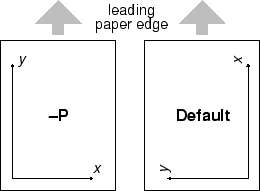 |
-P selects Portrait plotting mode4.8. In general,
a plot has an x-axis increasing from left to
right and a y-axis increasing from bottom to top. If the
paper is turned so that the long dimension of the paper is
parallel to the x-axis then the plot is said to have
Landscape orientation. If the long dimension of
the paper parallels the y-axis the orientation is called
Portrait (think of taking pictures with a camera
and these words make sense). The
default Landscape orientation is obtained by translating the origin in the
x-direction (by the width of the chosen paper PAPER_MEDIA) and then rotating the
coordinate system counterclockwise by 90![]() . By default the PAPER_MEDIA is
set to Letter (or A4 if SI is chosen); this value must be changed
when using different media, such as 11" x 17" or large format plotters
(Figure 4.18).
. By default the PAPER_MEDIA is
set to Letter (or A4 if SI is chosen); this value must be changed
when using different media, such as 11" x 17" or large format plotters
(Figure 4.18).